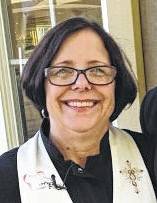
I don’t know about you, but I’m a different person than I was one year ago. I think that we are always changing as human beings, sometimes for the better and sometimes for, well the worse. As a woman of faith, change for the better means that I have grown closer to God, I’ve been more in tune with God’s will, and I’ve translated that deeper relationship into my interactions with others.
Change for the worse though would mean that I have intentionally chosen to look inward rather than outward. I have put my agenda before God’s. I have put on blinders and not been open to a change in myself that would make me a stronger, more loving human being. When we put self-first, before God, then we are sliding down a slippery slope that can only lead to division, conflict, greed and disappointment.
Each year on Epiphany, our church members draw a star with a word on it. The word is intended to be something we pray and think about all year. We ask ourselves questions. “What is God inviting me to do?” What does this mean for my life or for my ministry?
This year my word was reconciliation. Reconciliation — really? Our nation is so divided right now. As a country we have been behaving cruelly, foolishly and selfishly. Politics has torn families and friends apart. The pandemic has forced us to isolate for good reason from each other. Truth has become a casualty this year. Love for our neighbor is so strained. How does one ever even begin to embrace reconciliation?
We are called to be bridge builders. Relationships with other people are very important. Strong, respectful relationships are the building blocks for success in ministry, in work, in community. Being a bridge builder requires our attention and just like building a bridge, we must first lay the structural foundation. To do that in relationship building requires an open, honest heart and a pair of ears that are cleared to listen. We must learn to listen for understanding, which by the way is First Presbyterian Church’s word this year. Reconciliation and understanding go hand in hand.
What would it mean in our relationships if we listened for understanding? What would it mean if we sought to just understand another’s perspective without the desire to critique or make our point? How does it feel when someone just listens to you without judgment? Don’t you feel heard and accepted by the other person. Most of our conflict, I believe, comes from digging our heels into what we think is right and not being open to hear another’s perspective.
Reconciliation is not about agreeing on every topic. In fact, change only happens when we share our differing views in a respectful way. Reconciliation says we are willing to work for the common good. Reconciliation says all matter.
We are in a heap of trouble right now as a country and the way to resolve that is through reconciliation, through bridge-building, through our prayers and our desire to be more in tune with God’s will for us. We have so much to offer to each other and to our world. People are without work, without food, without shelter. People are grieving the loss of family and friends to COVID-19. Plans for a secure future are now in question. What seemed so important a year ago doesn’t seem to matter as much as health, safety and family.
I want to invite each and every one of you to think about how you might be an instrument of reconciliation? How might you change so that relational bridges can be built? How might you learn to listen for understanding? Well, it takes practice, lots of intentional practice. However, the more you do it, the stronger and healthier your relationships will become. The more each of us works on this one very important skill, the better the chance of building a movement of reconciliation in our nation and our world.


